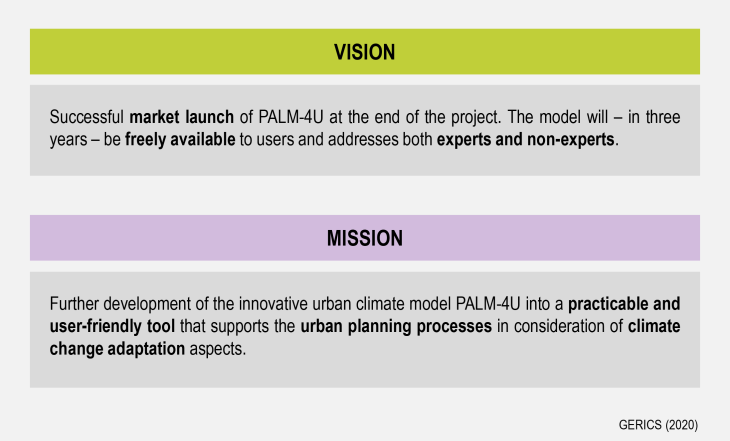ProPolis
Based on the results of [UC]² - Phase 1, the aim of the second funding phase is now to further develop PALM-4U according to the user requirements already identified and to create all the necessary prerequisites so that the model can be successfully operationalized at the end of the second project phase. The model will be accessible for all interested stakeholders.

These prerequisites must consider a broad spectrum of issues, which will be integrated in a continuation strategy. This strategy cannot be developed exclusively within ProPolis but is developed jointly with Modules A and B, as it has to consider the continuous development of PALM-4U according to new application fields and questions raised by users.
[UC]² - Phase 1 showed that the users in municipal practice have very different prerequisites with regard to capacities and competences. This results in a multitude of different application scenarios, which have to be considered in the continuation strategy. For instance, not all users will be able to operate the model on their own server. Therefore, a central server is needed and it must be clarified how large it must be, how users can access it and under which conditions they are willing to do so (or not) etc.
In order to attract many municipal users to apply PALM-4U it has to be useful and useable. This will be ensured through applying the living lab approach. In this frame, our practice partners will be able to test and evaluate PALM-4U in their specific application environments and provide feedback. A variety of use cases will be designed reflecting various scenarios: those that can use the model by themselves, those that are supported and those for which the application is completely done by experts. Part of these tests is also the graphical user interface.
Finally, it is important not only to develop a useful and useable model. It is of utmost importance to capacitate users in working with the model all by themselves and only provide support in case it is needed. This means that the successful trainings conducted in the first project phase will be further developed and, in addition, service and support offers will be developed. This will be supported by effective knowledge transfer and community building measures to ensure mutual learning even after the end of the project.

